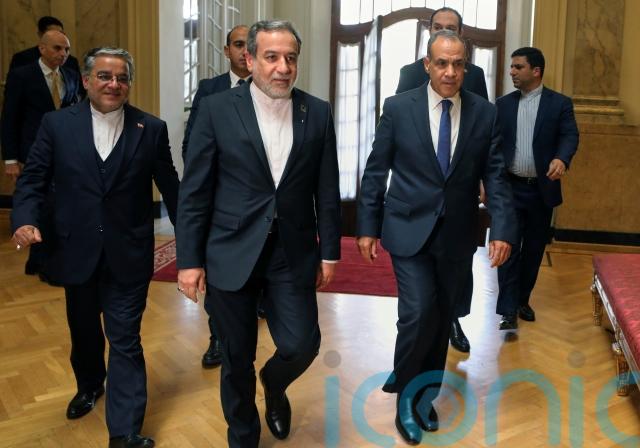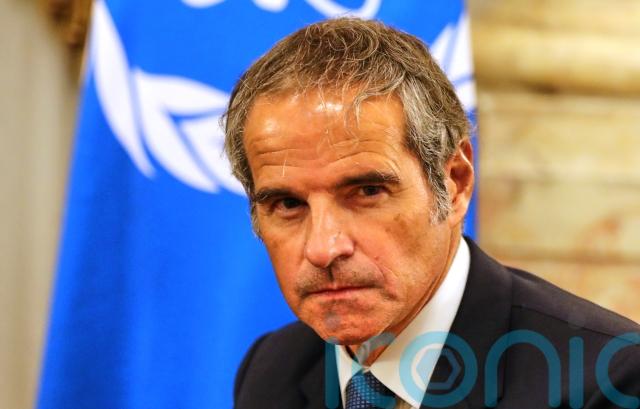
Iran and the International Atomic Energy Agency (IAEA) have signed an agreement paving the way for resuming co-operation, including on ways of relaunching inspections of Iran’s nuclear facilities.
The announcement followed a meeting in Cairo between Egyptian foreign minister Badr Abdelatty, his Iranian counterpart Abbas Araghchi and IAEA director general Rafael Grossi.
No further details were provided about the agreement, but Mr Grossi said at a joint news conference after the signing that it was technical in nature and highlighted the “indispensable” inspection work that needed to resume in Iran under the treaty of non-proliferation of nuclear weapons.
“It’s a step in the right direction,” Mr Grossi said.

Meanwhile, the Egyptian foreign ministry said the agreement followed “intensive” diplomatic efforts by that country.
And Egyptian president Abdel Fattah El-Sisi noted on Tuesday that the IAEA played a major role in supporting nuclear non-proliferation provisions, while emphasising the right of the Non-Proliferation Treaty State Parties to the peaceful uses of atomic energy.
On July 2, Iran’s president Masoud Pezeshkian signed a law adopted by his country’s parliament suspending all co-operation with the UN nuclear watchdog. This followed Israel’s 12-day war with Iran in June, during which Israel and the US struck Iranian nuclear sites.
The only site inspected by the IAEA since the war has been the Bushehr Nuclear Power Plant, which operates with Russian technical assistance. Inspectors watched a fuel replacement procedure at the plant over two days starting on August 27.
Mr Araghchi, the Iranian foreign minister, told reporters the agreement addressed his country’s concerns and security challenges and laid out technical requirements for co-operation with the IAEA.
But he warned that in the event of “any hostile act” against Iran, including the reimposition of UN sanctions, Tehran would regard the agreement with the IAEA as terminated.
Spoke with @rafaelmgrossi, @araghchi and Egypt FM Abdelatty.
Today’s framework deal for resuming inspections of Iran’s nuclear facilities could mark a crucial step for nuclear diplomacy, provided there is rapid implementation by Iran.
I thank Egypt for facilitating the process.
— Kaja Kallas (@kajakallas) September 9, 2025
The meeting came at a sensitive time as the UK, France and Germany began the process of reimposing sanctions on Iran on August 28 over what they have deemed non-compliance with a 2015 agreement aimed at preventing Iran from developing nuclear weapons.
The process — termed a “snapback” by the diplomats who negotiated it into Iran’s 2015 nuclear deal with world powers — was designed to be veto-proof at the UN and could take effect in a month.
The move set a 30-day clock ticking for the resumption of sanctions unless the West and Iran reached a diplomatic agreement.
European nations have said they would be willing to extend the deadline if Iran resumed direct negotiations with the US over its nuclear programme, allowed UN nuclear inspectors access to its nuclear sites, and accounted for the more than 400kg of highly enriched uranium the UN watchdog says it has.
A key European Union official cautiously welcomed the latest development late on Tuesday.
“Today’s framework deal for resuming inspections of Iran’s nuclear facilities could mark a crucial step for nuclear diplomacy, provided there is rapid implementation by Iran,” EU foreign policy chief Kaja Kallas wrote in a post on X, adding that she had spoken with both the IAEA chief and the Iranian foreign minister.

IAEA inspectors have been unable to verify Iran’s near bomb-grade stockpile since the start of the war on June 13, which the UN nuclear watchdog described as “a matter of serious concern”.
A confidential report by the Vienna-based IAEA said that as of June 13, Iran had 440.9kg (972lbs) of uranium enriched up to 60%.
If enriched to 90%, the uranium would be enough to make 10 nuclear weapons, according to IAEA calculations, although creating an actual weapon would require other expertise such as adding a detonation device.
According to the safeguards agreement that Iran has with the UN nuclear watchdog, Iran is obliged to produce a “special report” detailing the location and status of its nuclear material, including its highly enriched uranium stockpile, following events such as attacks or earthquakes, a senior diplomat said.
Egypt has been helping bolster co-operation between Iran and the IAEA.
Relations between Iran and the nuclear watchdog soured after the 12-day air war in June, which saw key Iranian nuclear facilities bombed.
The IAEA board said on June 12 that Iran had breached its non-proliferation obligations, a day before Israel’s airstrikes over Iran that sparked the war.
Subscribe or register today to discover more from DonegalLive.ie
Buy the e-paper of the Donegal Democrat, Donegal People's Press, Donegal Post and Inish Times here for instant access to Donegal's premier news titles.
Keep up with the latest news from Donegal with our daily newsletter featuring the most important stories of the day delivered to your inbox every evening at 5pm.